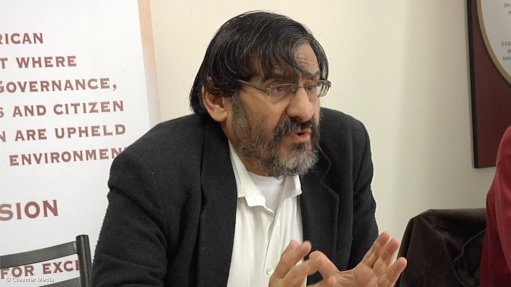
Political analyst Professor Steven Friedman
The complicated inheritance from South Africa’s past continues to extensively determine the present conditions of South African society and democracy as people have simply been absorbed into existing structures rather than changing them, which has seen essential institutions fundamentally remaining the same, said political analyst Professor Steven Friedman.
He was speaking at the Electoral Institute for Sustainable Democracy in Africa (EISA) seminar, held in the run-up to the country’s 2014 national elections on Wednesday, that interrogated whether ‘continuity, contestation or change’ could be said to predominate.
“It should not be implied that nothing has changed since the dawn of democracy, but we should acknowledge, instead, that the ‘democratic breakthrough’ of 1994 did not change the patterns of the past,” Friedman explained.
He noted that the dynamic of ‘path dependency’, the theory of Nobel Prize-winning economic historian Douglass North which describes the way the patterns of the past tend to shape the future, was extremely unhealthy for society, while at the same time admitting that much of what had been done before 1994 for the minority of the population were assets to society. However, even after 20 years of democracy, this cultural minority remained remote from the political majority.
”The irony of path dependency can be see through the bargaining system –regarded as one of South Africa’s considerable achievements – which is now under pressure because of the historical consequence of inequality and the poverty effect.
“So, in a sense the negative effects are beginning to eat into the positive gains we’ve enjoyed over the last 20 years,” he said.
He noted that the 2014 election would be the most competitive election because the governing party was now experiencing difficulties that stemmed from that inequality that it did not have before. In particular, supporters were unhappy with the current leadership, the split of Congress of South African Trade Unions, as well as difficulties in the African National Congress Youth League.
Friedman noted that the elections would also challenge another form of South African path dependency – the nature of the electoral contest, which is, in turn, implicated in the economic and social effects in society. However, he said “the extent of this competitiveness is being hyped up beyond proportion”. He predicted that after the elections while there would be shifts they would probably be in the region of approximately 4% to 5%.
Friedman praised the Independent Electoral Commission, saying the system worked well regardless of the individual heading the commission, referring to chairperson Pansy Tlakula, against whom allegations of financial impropriety have been levelled.